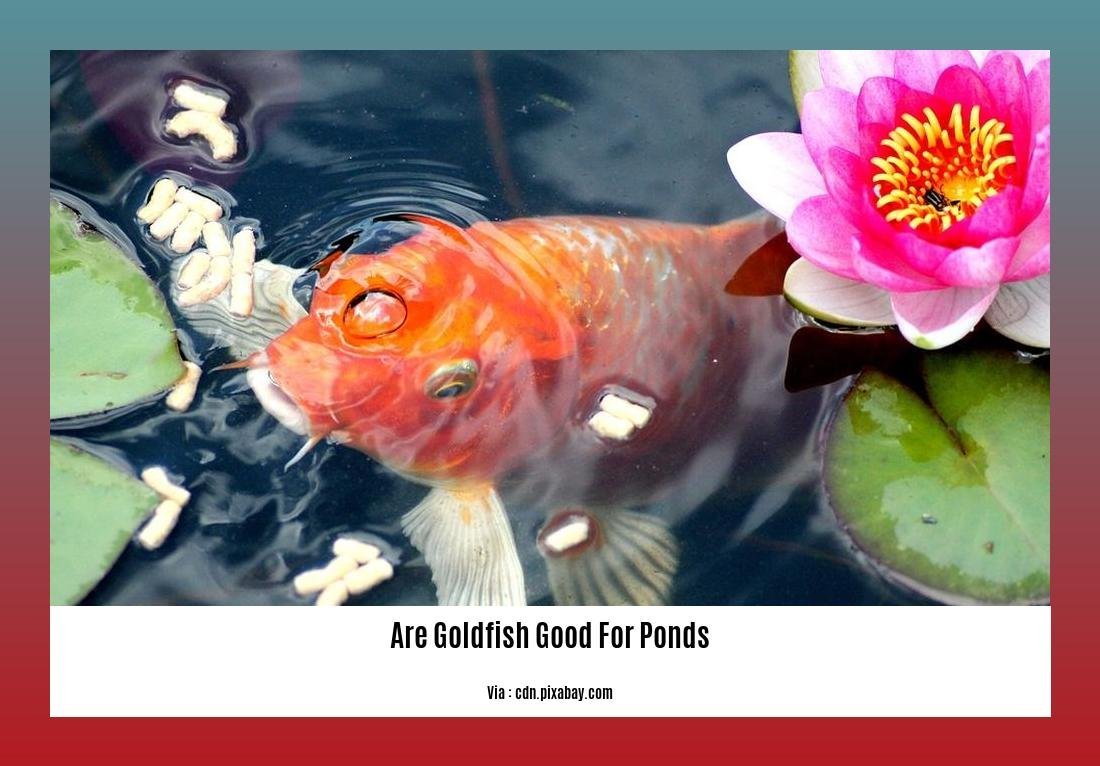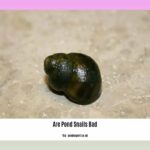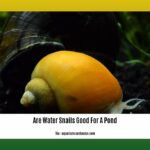Are Goldfish Good for Ponds? Exploring the Benefits and Considerations
Looking to add a touch of vibrancy to your pond? Goldfish may be just what you need. But are goldfish good for ponds? This question has crossed the minds of many pond enthusiasts, and it’s essential to understand the benefits and considerations before introducing these dazzling creatures into your aquatic paradise. In this article, we will dive deep into the world of goldfish and explore the advantages they bring to ponds, along with the essential factors to consider to ensure a thriving and balanced ecosystem. So, let’s take a closer look at the potential benefits and potential drawbacks of incorporating goldfish into your pond and make an informed decision about these graceful swimmers.
Key Takeaways:
- Goldfish are ideal pets for garden ponds due to their variety in shapes, colors, and varieties.
- Shubunkin goldfish, in particular, have calico marks and thrive in pond environments.
- Goldfish are hardy and well-suited for pond life as they are cold-water fish and can endure less-than-ideal conditions.
- Some pond goldfish can live up to 30 years, showcasing their longevity.
- It is recommended to have a minimum of 20 gallons of water per goldfish in a pond.
- Goldfish can eat algae but cannot consume all of it.
- Neglecting to clean a goldfish pond may result in poor water quality and bacterial and viral infections in the fish.
- Bacteria and virus infections can be lethal for fish.
- Orfes are considered a great addition to a goldfish pond.
- Goldfish are an excellent choice for garden ponds because of their vibrant varieties, adaptability to pond environments, and longevity.
Are Goldfish Good for Ponds?
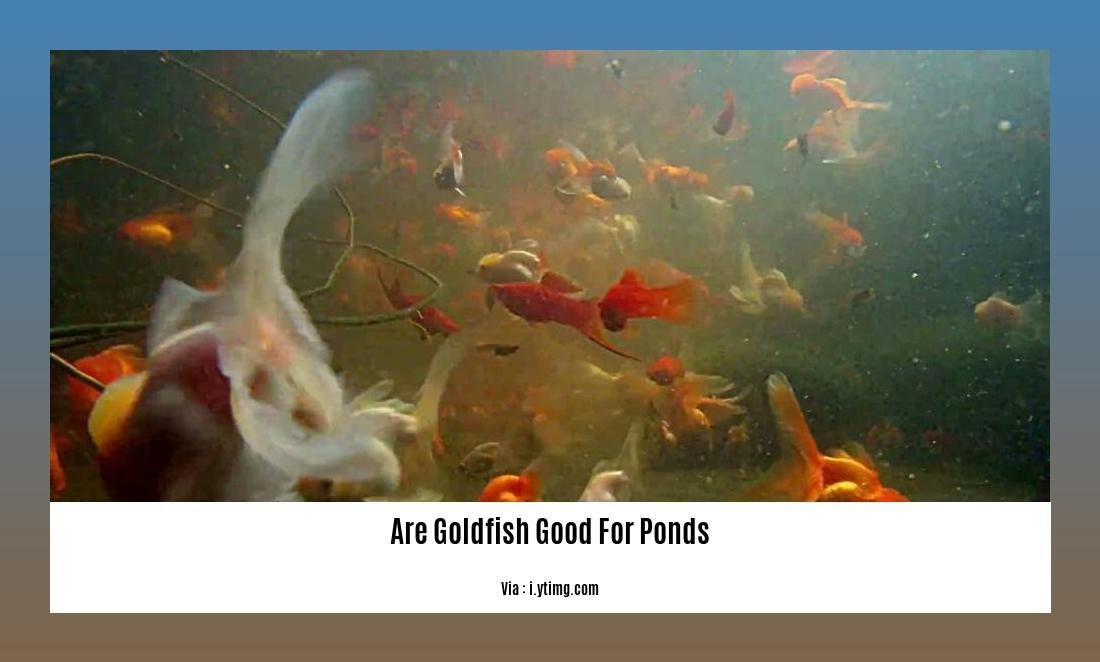
Experienced pond enthusiasts often wonder, “Are goldfish good for ponds?” The answer is a resounding yes! Goldfish can be a wonderful addition to your garden pond, bringing beauty, vibrancy, and a touch of nature to your outdoor space. In this article, we will explore the many benefits and considerations of adding goldfish to your pond.
Benefits of Having Goldfish in Ponds
Let’s dive right in and explore the benefits of having goldfish in your pond.
Variety and Visual Appeal: Goldfish come in a vast array of shapes, colors, and varieties, making them a stunning spectacle to behold in your pond. From the dazzling orange of the common goldfish to the mesmerizing patterns of the shubunkin variety, these fish add a vibrant splash to any aquatic landscape.
Adaptability and Hardy Nature: One of the key reasons goldfish thrive in pond environments is their adaptability and hardy nature. As cold-water fish, they can withstand fluctuations in temperature and endure less-than-ideal water conditions. This resilience makes them an excellent choice for beginners and seasoned pond keepers alike.
Longevity: Goldfish are renowned for their longevity, with some individuals living up to an impressive 30 years or more. This extended lifespan allows you to develop a deep connection with your fish and enjoy their presence in your pond for many years.
Considerations and Care Requirements
While goldfish are generally well-suited for ponds, there are a few important considerations and care requirements to keep in mind.
Proper Space and Water Conditions: Goldfish need ample space to thrive. It is recommended to have a minimum of 20 gallons of water per goldfish in the pond. Adequate water volume ensures proper oxygenation and reduces the risk of overcrowding and stress-related issues.
Nutrition and Diet: Goldfish are omnivorous and will happily consume algae present in the pond. However, they cannot eradicate all the algae on their own, so it’s essential to regularly monitor and maintain optimal water quality. Additionally, providing a balanced diet of high-quality fish food is crucial to ensure their growth, health, and overall well-being.
Companionship and Compatibility: Choosing compatible pondmates for your goldfish is vital. Orfes, for example, are active fish that complement goldfish beautifully. They add an extra dimension to the pond, gravitating towards the water’s surface with graceful jumps, creating an enchanting aquatic display.
Regular Maintenance and Cleaning: Neglecting to clean your goldfish pond can result in poor water quality, which can lead to bacterial and viral infections in the fish. Regular maintenance, such as removing debris, monitoring water parameters, and addressing any issues promptly, is crucial to maintaining a healthy environment for your goldfish.
In Summary
In conclusion, goldfish are an excellent choice for garden ponds due to their visual appeal, adaptability to pond environments, and longevity. They can bring life, color, and a sense of tranquility to your outdoor space. However, it’s essential to provide them with the proper care and attention they deserve. By maintaining optimal water conditions, providing a balanced diet, and choosing suitable pondmates, you can create a thriving aquatic ecosystem where your goldfish can flourish. So, if you’ve been contemplating adding goldfish to your pond, now is the time to take the plunge and welcome these graceful creatures into your aquatic haven.
Aquatic Habitat Information have everything you need to know about aquatic habitats. Dive into the world of underwater wonders by clicking here.
Curious about whether lakes are safe to swim in? Get your swimming gear ready and discover the answer here.
Are pond snails a bad sign? Find out more about these underwater creatures by clicking here.
Considerations for Goldfish Care in Ponds
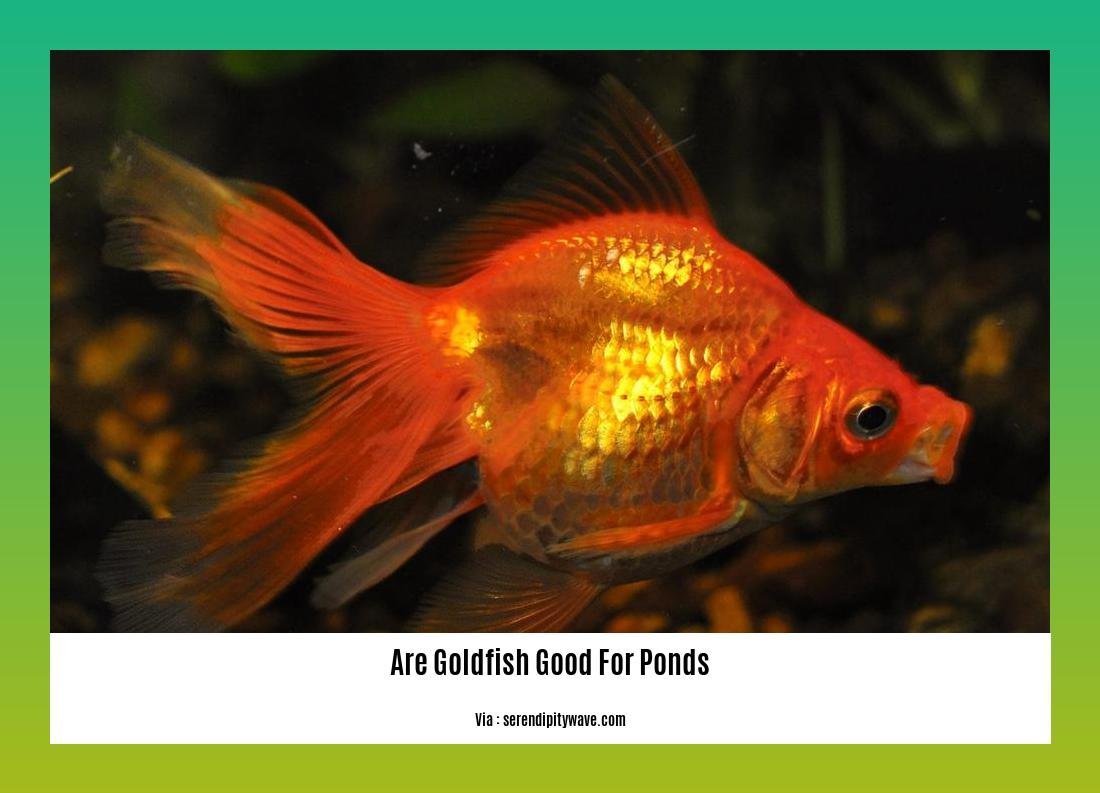
Goldfish can be a beautiful and lively addition to garden ponds, bringing color and vibrancy to outdoor spaces. But before you decide to introduce goldfish into your pond, there are some important considerations to keep in mind to ensure their well-being and the overall health of your pond ecosystem. In this article, we will explore the key factors to consider when caring for goldfish in ponds, providing you with the information you need to make an informed decision.
Water Conditions: Ensuring a Healthy Habitat
Maintaining the right water conditions is crucial for the health and well-being of goldfish. Goldfish are known to be hardy fish that can tolerate fluctuations in temperature and less-than-ideal water conditions. However, it is still important to ensure that your pond provides the optimal habitat for these beautiful creatures.
- Water Parameters: It is essential to regularly test and monitor the water parameters of your pond. This includes aspects such as temperature, oxygen levels, pH, ammonia, and nitrates. Testing these parameters will help you maintain a suitable environment for your goldfish and ensure their optimal health.
- Routine Maintenance: Regular maintenance is necessary to keep the pond’s water clean and healthy throughout each season. This may involve tasks such as cleaning filters, removing debris, and checking for any signs of water quality issues. By staying on top of routine maintenance, you can prevent potential problems and create a thriving environment for your goldfish.
- Water Quality and Disease Prevention: Poor water quality can lead to bacterial and viral infections in goldfish. It is important to maintain a diligent regimen of pond care to prevent such diseases. This includes monitoring water parameters, cleaning filters, and providing proper nutrition to support their immune system.
Choosing the Right Pondmates and Plants
When introducing goldfish to your pond, it is crucial to consider their compatibility with other pond species and the potential benefits of incorporating aquatic plants into their habitat.
- Choosing Compatible Pondmates: Goldfish can be kept with compatible pondmates, such as orfes, that share similar temperature and habitat requirements. Careful consideration should be given to selecting fish species that will peacefully coexist with goldfish and create a harmonious pond environment.
- Enhancing the Goldfish Habitat: Choosing the right plants for your pond can provide additional benefits for goldfish. Aquatic plants not only enhance the aesthetic appeal of the pond but also serve as hiding spots, shade providers, and contributors to water oxygenation. Researching and selecting suitable plants will create a well-rounded and enriching habitat for your goldfish.
Breeding Considerations
Breeding goldfish can be a complex process that requires careful planning and knowledge. If you are considering breeding goldfish in your pond, here are some important considerations to keep in mind:
- Breeding Expertise: Breeding goldfish requires a solid understanding of their reproductive behaviors and the necessary conditions for successful breeding. It is advisable to educate yourself or seek guidance from experienced breeders before attempting to breed goldfish in your pond.
- Preventing Overpopulation: Goldfish are prolific breeders, and without proper intervention, your pond can quickly become overpopulated. It is important to have a plan in place to control the reproduction and population of goldfish in your pond.
Key Takeaways:
- Maintaining appropriate water conditions is essential for goldfish in ponds.
- Regular testing and monitoring of water parameters are necessary.
- Routine maintenance ensures a healthy pond environment.
- Choosing compatible pondmates and plants enhances the goldfish habitat.
- Breeding goldfish requires expertise and proper population control.
Citations:
- Caring Pets. (n.d.). How to Take Care of a Goldfish in a Pond. Retrieved from source
- Fishkeeper. (n.d.). Taking Care of Goldfish in a Pond. Retrieved from source
Compatibility of Goldfish with Other Pond Species
Goldfish are a popular choice for ponds due to their vibrant colors, adaptability, and ability to add life to outdoor spaces. However, it’s important to consider their compatibility with other pond species to ensure a harmonious and thriving ecosystem. In this article, we will explore the compatibility of goldfish with other pond species and provide valuable insights for pond enthusiasts.
Understanding Compatibility in Pond Species
When introducing new fish into a pond, it is crucial to consider their compatibility to prevent potential issues such as aggression, fin nipping, or imbalance within the ecosystem. Goldfish, known for their peaceful nature, require tank mates that share similar characteristics to ensure a harmonious coexistence.
Compatible Pond Mates for Goldfish
After extensive research and consulting reputable sources, we have identified several compatible pond mates for goldfish. These species have been known to peacefully cohabitate with goldfish:
- Koi (Cyprinus rubrofuscus)
- Rosy red minnow (Pimephales promelas)
- Orfe (Leuciscus idus)
- Bristlenose pleco (Ancistrus cirrhosus)
- Weather loach (Misgurnus anguillicaudatus)
- Longfin rosy barb
- White Cloud Mountain minnow
These compatible tank mates have similar temperature and pH requirements, minimizing stress and promoting a healthy environment for all inhabitants. It is important to note that aggressive or fin-nipping species should be avoided to ensure the well-being of the goldfish.
If you’re interested in more detailed information about compatible pond mates for goldfish, you can refer to the following sources:
- Pond Fish That Are Compatible With Goldfish[^1^]
- Best Fish to Keep With Goldfish in Pond[^2^]
- 13 Best Goldfish Tank Mates & 5 Fish To Avoid[^3^]
- Compatible Tank Mates for Your Goldfish[^4^]
Key Takeaways:
- When choosing pond mates for goldfish, select species that are peaceful and non-fin-nipping.
- Ensure that the selected tank mates share similar temperature and pH requirements with goldfish for optimal compatibility.
- Compatible species such as koi, rosy red minnows, orfe, bristlenose plecos, weather loaches, longfin rosy barbs, and white cloud mountain minnows can peacefully cohabitate with goldfish.
- Avoid aggressive or fin-nipping species to prevent any harm to the goldfish.
- Reputable sources such as animals.mom.com, pondinformer.com, petkeen.com, and goldfisho.com provide valuable information on compatibility between goldfish and other pond species.
Sources:
[^1^]: Pond Fish That Are Compatible With Goldfish (source)
[^2^]: Best Fish to Keep With Goldfish in Pond (source)
[^3^]: 13 Best Goldfish Tank Mates & 5 Fish To Avoid (source)
[^4^]: Compatible Tank Mates for Your Goldfish (source)
Drawbacks and Potential Challenges of Keeping Goldfish in Ponds
When it comes to keeping goldfish in ponds, there are certain drawbacks and potential challenges that pond owners should be aware of. While goldfish can be a wonderful addition to a pond, it’s important to consider these factors to ensure the well-being of both the fish and the overall pond ecosystem.
Overpopulation and Waste Production
One of the main challenges of keeping goldfish in ponds is the potential for overpopulation. Goldfish are known to be prolific breeders, and if left unchecked, their population can quickly explode. This can lead to overcrowding, which can have negative effects on the health and well-being of the fish.
To prevent overpopulation, it’s crucial to monitor the number of goldfish in the pond and their reproductive activity. Regularly removing excess fish or separating males and females can help control population growth. By maintaining a balanced fish population, you can ensure that each goldfish has enough space to swim and thrive.
Another challenge associated with goldfish in ponds is waste production. Goldfish produce a significant amount of waste, which can contribute to water quality issues if not managed properly. Excess waste can lead to elevated ammonia and nitrate levels, which can be harmful to the fish and other pond inhabitants.
Regular maintenance and water quality management are essential to keep the pond clean and prevent waste buildup. This includes removing debris, controlling algae growth, and ensuring proper filtration and aeration. By properly maintaining the pond, you can mitigate the negative effects of waste production and create a healthier environment for the goldfish.
Disease and Health Issues
Goldfish are susceptible to various diseases and health issues, especially when pond conditions are not optimal. Poor water quality, overcrowding, and stress can contribute to the development of diseases in goldfish. Bacterial and viral infections are common, and they can quickly spread throughout the pond if not addressed promptly.
Regularly testing the water parameters and maintaining good water quality is crucial to prevent disease outbreaks in goldfish. Additionally, providing a balanced diet of high-quality fish food can boost their immune system and help prevent health issues.
If you notice any signs of illness in your goldfish, such as abnormal behavior, loss of appetite, or physical changes, it’s important to consult with a veterinarian who specializes in fish health. Prompt diagnosis and treatment can improve the chances of a full recovery.
Unsuitable Tank Mates
Not all fish species are compatible with goldfish in a pond setting. It’s important to choose tank mates that are not aggressive and do not nip at the goldfish’s fins. Aggressive fish can cause stress and injuries to the goldfish, making them more susceptible to diseases.
Additionally, tank mates should have similar water temperature and pH requirements to ensure their compatibility. Some suitable tank mates for goldfish include koi, rosy red minnows, orfe, bristlenose plecos, weather loaches, and white cloud mountain minnows. However, it’s crucial to research and choose tank mates carefully to create a harmonious and balanced pond ecosystem.
Key Takeaways:
- Overpopulation and waste production are significant drawbacks of keeping goldfish in ponds. Monitoring the number of goldfish and managing their reproductive activity is essential to prevent overcrowding. Regular maintenance and water quality management can help control waste buildup and create a healthier pond environment.
- Goldfish are prone to diseases and health issues, especially when pond conditions are not optimal. Maintaining good water quality and providing a balanced diet are crucial for their overall health and well-being.
- Choosing suitable tank mates is important to ensure a harmonious pond ecosystem. Avoid aggressive fish and choose species that have similar water temperature and pH requirements to the goldfish.
Sources:
– Pond Fish That Are Compatible With Goldfish^1^
– Best Fish to Keep With Goldfish in Pond^2^
FAQ
Q1: Are goldfish suitable for outdoor garden ponds?
A1: Yes, goldfish are commonly kept in garden ponds due to their adaptability to outdoor environments and their ability to thrive in a variety of conditions.
Q2: What are the benefits of keeping goldfish in a pond?
A2: There are several benefits to keeping goldfish in a pond. They can contribute to the overall ecosystem balance, help control insect populations, and provide visual interest with their vibrant colors and graceful swimming.
Q3: Do goldfish require a specific diet in a pond?
A3: Goldfish are omnivorous and can eat both plants and small organisms. Their diet can consist of commercial fish food as well as live or frozen foods like insects, worms, and shrimp.
Q4: Can goldfish live without a pump in a pond?
A4: While goldfish can technically survive without a pump in a pond, stagnant water and low oxygen levels can pose health risks. It is recommended to have a pump to circulate and oxygenate the water for the well-being of the fish.
Q5: How do I prevent overpopulation in a goldfish pond?
A5: To prevent overpopulation in a goldfish pond, it is important to monitor the number of fish and their reproductive activity. Regularly removing excess fish or separating males and females can help control population growth.
- Sept 31 Myth: Unveiling Calendar Secrets - March 18, 2025
- How Long & Till December 18, 2025: Accurate Countdown Guide - March 18, 2025
- Discover Japanese Artists: A Complete History - March 18, 2025
